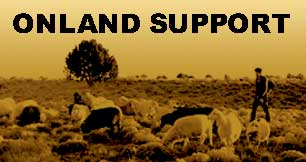Black Mesa EIS meeting one for the record
January 3, 2007 by pathfinder
Filed under Archives
Black Mesa EIS meeting one for the record
By Kathy Helms
Dine Bureau
Wednesday, January 3, 2007
WINDOW ROCK — To call Tuesday night’s meeting on Peabody Western
Coal Co.’s Black Mesa Project a public hearing, “is really
inadequate,” Navajo Nation Council Delegate Amos Johnson told
federal officials.
But that wasn’t the only complaint in an evening that didn’t get
off to a good start and broke up just short of descending into
verbal chaos.
The Office of Surface Mining Reclamation and Enforcement’s initial
hearing on the Draft Environmental Impact Statement for the Black
Mesa Project was set to begin at 6 p.m. at Navajo Nation Museum.
However, because Navajo Nation President Joe Shirley Jr. gave
tribal employees the day off to mark the passing of former U.S.
President Gerald Ford, the museum was closed.
And though it was a national day of mourning for federal employees
as well, Calvin Johnson of C-aquifer for Dine said the last word
his group had was that the OSM meeting would go forth as planned
because it already had been advertised in the Federal Register.
At the last minute, Tuesday evening’s meeting was moved to Day’s
Inn in St. Michael’s and a person placed at the museum to advise of
the change in location.
Johnson (Black Mesa/Forest Lake) was the only delegate out of 88 to
attend, and afterward chastised OSM for the way it was conducted.
The audience was invited to watch a slide show recorded in the
Navajo language about the proposed project described in the more
than 700-page EIS, Afterward, those wishing to comment were asked
to sit at a table sectioned off in a corner of the room and speak
into a microphone while a court reporter recorded their comments
for OSM’s record.
“Just listening to a video and making our comments into a recorder
is really not a public hearing,” Johnson said. “I wish it would
have been more formal.
“The video in Navajo, there were some words that were not properly
translated and then they were being cut off right in the middle of
some of the sentences. They were incomplete,” he added.
Richard Holbrook, Southwest Branch chief for OSM, asked Johnson
whether he noted those issues on his comment form. “We want to be
sure that comments like these get into the record,” he said.
“The purpose of the meeting is for us to gather your comments. The
purpose of the meeting is not a forum for having a meeting for
talking to the other people in the group. It’s to talk to us, and
that’s why we set it up this way.
“We felt that a little less formal atmosphere might be more
conducive to gathering comments from people,” Holbrook said.
Andy Bessler of Sierra Club in Flagstaff asked the estimated 20 to
30 people in attendance, “How many people here would like to be
able to address OSM formally?” He motioned for a show of hands.
Holbrook, his tone more firm, responded, “I would like for you ALL
to address OSM formally, and that’s why we have a court reporter
who is transcribing comments.
A woman in the audience said her concern would be “the
retranslation of what people actually said. It may not be the whole
picture of what a person said. If it’s in a public forum, then
everybody hears.”
Holbrook assured the audience their comments would be recorded
verbatim.
Nicole Horseherder of To Nizhoni Ani asked Holbrook, “How many
public hearings have you had like this?” Holbrook said OSM has not
in the past used that particular format, but said it is now widely
used by the Forest Service and is becoming a common format for the
Bureau of Land Management.
Norman Brown of Dineh Bidziil Coalition tried to explain that
something had been lost through the change in process.
“I guess from a cultural perspective, the life that we live, how we
communicate and how we share as a community is being removed from
how we conduct our business. I think that’s what a lot of people
are saying here tonight.
“By not allowing our cultural way of life on our land, it’s
difficult for some of us to understand why that cultural component
is not there,” Brown said.
Holbrook said OSM put the meeting format before both Navajo and
Hopi tribal governments and solicited their comments and concerns.
“They felt this was a perfectly acceptable way to conduct these
meetings,” he said.
Brown asked him, “Do you have the authority to change the format on
how these meetings are for the next 10 days?”
Holbrook responded, “Yes, I do.”
Brown countered. “Are you willing to …” but was interrupted by
Holbrook.
“No, I’m not. We’re going to continue with the format that we have
right now,” he said.
Brown asked him, “Can you explain why we’re not allowed to hear
each other?” (when commenting)
Holbrook told him, “You have plenty of opportunities to discuss
these things amongst yourselves in format. It’s my understanding
there was a meeting earlier today for that.”
Brown said, “So, our cultural concerns as a community are really
not important to …”
“Of course they are! But not in the context of this meeting,”
Holbrook said, once again cutting Brown off in mid sentence.
Fern Benally of Black Mesa told Holbrook, “It seems like based on
the presentation and all these posters here, that you’ve already
decided what you’re going to do, and you’re not going to listen to
us at all. It makes me mad.”
Holbrook told her no decision has been made, however, Benally
continued. “You’ve exploited us since the beginning and you’re
going to continue to do so,”
“I’m sorry you feel that way,” Holbrook replied.
“I do feel that way!” Benally said. “And that really pisses me off,
because you’ve been like that with the (public scoping) hearing a
couple years ago, and you continue to have that attitude. I do not
like it. It seems like you, by yourself, decided this whole thing
is going to be the way you want it to.”
Holbrook said the purpose of the meeting is to learn, “and yes,
you’re right. It is to our benefit to have these meetings the way
they are because we need to get from you, your comments.”
Benally disagreed. “You’re just trying to have these meetings to
make you look good, that’s all you’re doing it for.”
Dineh Bidziil’s Brown asked John Stucker, a non-Navajo tribal
employee, “Do you agree with this format? Do you agree it’s healthy
for our people? Do we have a point here or not?”
But Holbrook interrupted, drowning out Brown and Stucker. “We have
answered that question and we appreciate your comment.”
Brown said, “No, I’m talking to him.” (Stucker)
“I know you’re talking to him, and I’m answering your question!”
Holbrook said. “I think you ought to take your comment and get it
onto the record. The purpose of this meeting is not to carry on a
dialogue about the merits of this project or the merits of the way
we are conducting this meeting.
“We know you are distressed — you in particular — and others
here, with the format of the meeting,” Holbrook said to Brown. “We
are aware of that. Thank you very much for making those comments.”
Brown tried to interject, however, Holbrook’s voice was louder.
“There is no purpose to carry on this dialogue,” he said.


